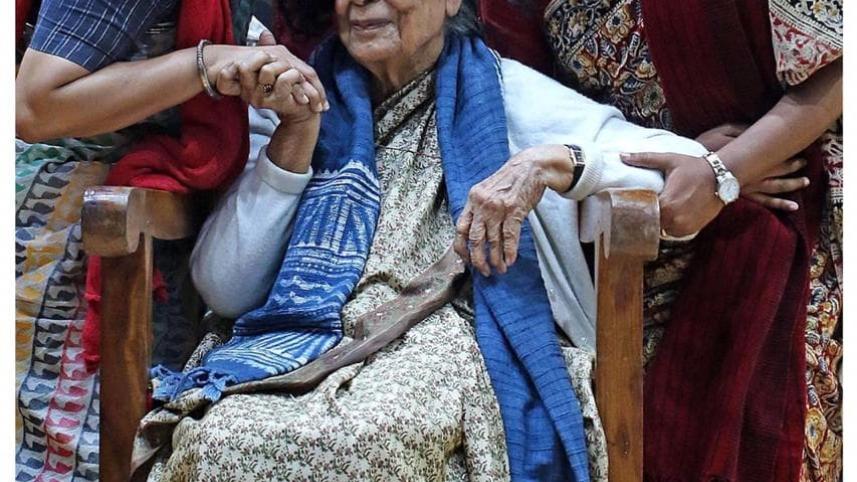Munira Morshed Munni talks about Sayeeda Khanam

Munira Morshed Munni, a student from the first batch of Pathshala South Asian Media Institute, has been working as a teacher, filmmaker and photographer for years. She was a close associate of Sayeeda Khanam, Bangladesh's first professional female photographer, who passed away yesterday. In observance of World Photography Day, Munni shares her fondest memories of Khanam in a recent conversation with The Daily Star.
When Munni was studying at University of Dhaka (DU), she only caught a couple glimpses of Khanam, who worked as a librarian in the seminar library of the Bangla Literature Department of DU at the time. Munni's first proper interaction with her happened during a rather awkward incident. A friend of Munni from India had brought some flowers for their teacher. After a long wait beside the library and a failed attempt to see him, they decided to give the bouquet to Khanam instead. Although they pretended that the flowers were for her, they were caught red handed.
"You missed him, didn't you?," Sayeeda apa had asked," smiles Munni. "She threw us off with her direct question. It was really embarrassing. The next day, I decided to get her flowers. I will never forget the childlike joy on her face, from that day." Both of them instantly clicked, and bonded over their mutual love for photography, exploring places and spaces together, over the years. "Apa loved to roam around Dhaka. Dining at a restaurant was one of her favourite things to do," adds Munni. "She was way ahead of her time, and she chose to live as a celibate. I believe that is an indicator of her strong will and her dedication towards her work. She lived her life exactly the way that she wanted to – something which is unthinkable for many, even today."
Khanam belonged to an educationally and a culturally rich family. Her eldest sister, who goes by the name Lily, was a direct student of Shilpacharya Zainul Abedin, her elder sister Hamida Khanam is the founding principal of Dhaka's Home Economics College and renowned Bangladeshi composer and singer Abdul Ahad is her brother. Khanam attained her Master's in Bangla Literature and Library Science from DU. Munni was strongly influenced by her. "Their house had a freeing aura about it. Apa was a multidisciplinary person. She loved watching classic films, listening to music, reading and writing," she says. "Many threw stones at her when she went out – they found it hard to accept that a woman was working in a male-dominated field."
Despite the harsh backlashes, Khanam continued to pursue her passion. She was the first Bangladeshi to interview Satyajit Ray, for the cine magazine, Chitrali. The interview was published in 1962. She also became a family friend of Ray. The maestro and his wife called her by her nickname, Badol.
She worked with Ray, her Manikda, as a photographer in three of his films. Her works on Ray enabled her to organise three solo exhibitions and write the popular book, Amar Chokhe Satyajit. Her wish of making a film remained unfulfilled after the passing of her beloved Manikda.
"Apa and her close friend Aleya Ferdousi once took a tanga and visited the Taj Mahal at night," Munni shares. Khanam largely covered events before the Liberation War of Bangladesh in 1971. However, only about 30 of these works could be retrieved and digitised as an initiative of Drik, through Munni. "Apa always feared that her photographs would be stolen," Munni adds. "She would keep them locked in a box. It took a great deal of persuasion from our side, to have some of her photographs digitised. Afterwards, we used them in many exhibitions and publications, along with the works of Rashid Talukder. I really hope her works receive proper documentation."
Khanam, who was awarded the Ekushey Padak in 2019, was a rather romantic person, who loved the river banks and the moonlight. Leading an undaunted and simple life, she valued her educational and economic freedom. "Finish your education, or else no one will value you—That was a soft, but firm life advice that she gave to my daughter," concludes Munni.



 For all latest news, follow The Daily Star's Google News channel.
For all latest news, follow The Daily Star's Google News channel.
Comments